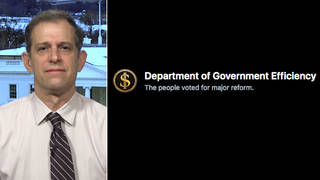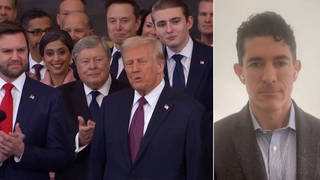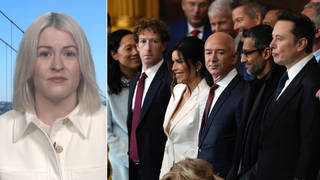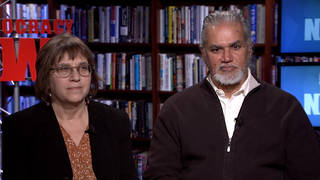HeadlinesJanuary 21, 2014
Obama Preserves Bulk Collection of Metadata, Curbs Foreign Spying in Surveillance Reforms
President Obama has unveiled his long-awaited review of the National Security Agency’s surveillance programs over six months since Edward Snowden exposed them to global scrutiny. In a move criticized by privacy advocates, Obama refused to end the bulk collection of telephone metadata, saying only he will modify it from “how it currently exists.”
President Obama: “I am therefore ordering a transition that will end the Section 215 bulk metadata program as it currently exists, and establish a mechanism that preserves the capabilities we need without the government holding this bulk metadata. This will not be simple.”
Under Obama’s proposal, NSA officials would require court orders to access calling records, except in cases of emergency. But it will be up to the Justice Department and Congress to work out the details. In his remarks, Obama also pledged to stop the spying on foreign leaders and to increase privacy protections for foreign citizens overseas.
President Obama: “Now let me be clear: Our intelligence agencies will continue to gather information about the intentions of governments — as opposed to ordinary citizens — around the world, in the same way that the intelligence services of every other nation does. We will not apologize simply because our services may be more effective. But heads of state and government, with whom we work closely and on whose cooperation we depend, should feel confident that we are treating them as real partners. And the changes I’ve ordered do just that.”
Obama Rejects Panel on National Security Letters, Software Hacking
President Obama’s plan rejects a number of proposals from his own advisory panel on reforming the National Security Agency including a call to require court orders for national security letters by the FBI. It also ignores the panel’s call to stop undermining commercial software in order to launch surveillance or cyber-attacks. Obama accepted a proposal to establish a panel of privacy advocates to appear before the Foreign Intelligence Surveillance Court, but only in special cases. Responding to Obama’s speech, Jesselyn Radack, an adviser to Edward Snowden and former Justice Department lawyer, criticized Obama for leaving the bulk collection of metadata intact.
Jesselyn Radack: “I’m happy that the government will no longer be housing people’s records, but that begs the question of why — why the government should be storing anybody’s records at all. And I think a lot of people might mistake that storing issue for the government not collecting. And the bulk metadata collection program remains intact; it continues. And they’re going to transition it, but that doesn’t really tell us anything. If they’re going to overhaul it in some kind of fashion, we have no idea. The point is, they are still collecting mass metadata on hundreds and thousands of innocent Americans.”
House Intel Chair: Snowden Spied for Russia; Gov’t Officials Call for Snowden’s Murder
As President Obama unveiled reforms prompted by Edward Snowden’s disclosures, Snowden himself faced new attacks from lawmakers and intelligence officials. Speaking to NBC’s Meet the Press, House intelligence chair Mike Rogers suggested, without citing evidence, that Snowden is a Russian spy.
Rep. Mike Rogers: “This was a thief, who we believe had some help, who stole information. The vast majority had nothing to do with privacy. Our Army, Navy, Air Force, Marines have been incredibly harmed by the data that he has taken with him and we believe now is in the hands of nation states. I believe there’s a reason he ended up in the hands, the loving arms of an FSB agent in Moscow. I don’t think that’s a coincidence.”
The website Buzzfeed, meanwhile, has published an article featuring anonymous intelligence officials called “America’s Spies Want Edward Snowden Dead.” It quotes one Pentagon official saying: “I would love to put a bullet in his head … he is single-handedly the greatest traitor in American history.” An NSA analyst also tells Buzzfeed: “In a world where I would not be restricted from killing an American, I personally would go and kill him myself. A lot of people share this sentiment.”
West Virginia Lifts Water Ban as Dozens Visit Hospitals
West Virginia has lifted its ban on consumption of tap water following the chemical spill that contaminated a major part of the state’s water supply. But despite the lifting of the ban, dozens of people were treated at local hospitals over the weekend for symptoms of chemical exposure. Pregnant women have also been told to continue using bottled water as a precaution.
Freedom Industries Could Evade Chemical Spill Liability with Bankruptcy Filing, Shell Firm
As the ban was lifted, the company behind the West Virginia chemical spill filed for bankruptcy. The move will grant Freedom Industries at least a temporary reprieve from lawsuits. It also could allow the company’s owner, J. Clifford Forrest, to retain control of his assets while escaping liabilities. Forrest is listed as a founder of a new shell company called Mountaineer Funding, which would run Freedom Industries without having to assume legal responsibility for the spill.
4 Killed in 2 Blasts at U.S. Plants
Four people have died and scores have been injured in explosions at industrial plants in two states. Two workers were killed and at least 10 others were injured, some critically, at an animal feed plant in Omaha, Nebraska. Omaha fire chief Bernard Kanger said the building suffered major damage.
Bernard Kanger: “This is a large building with significant structural damage. At 1400 hours — I’m sorry, 2:00 this afternoon, we went from a rescue mode into a recovery mode. What that means is we’ve slowed down our operation. The chance of finding any victims that are alive has — is no longer there. And now it is a recovery mode, where our efforts are to secure the building, go in and retrieve the victims and search for additional victims that may be in the structure.”
Meanwhile in Madill, Oklahoma, two workers burned to death after their plant’s furnace exploded.
U.N. Withdraws Iran Invite to Syria Talks After U.S. Opposition
U.N. Secretary-General Ban Ki-moon has withdrawn an invitation for Iran to attend the Syria peace talks after pressure from the United States. A spokesperson said Iran had reneged on a pledge to support a transitional government in Syria, the basis for Wednesday’s meeting in Switzerland.
Martin Nesirky: “In a series of meetings and telephone conversations, senior Iranian officials assured the secretary-general that Iran understood and supported the basis and goal of the conference, including the Geneva Communiqué. The secretary-general is deeply disappointed by Iranian public statements today that are not at all consistent with that stated commitment. He continues to urge Iran to join the global consensus behind the Geneva Communiqué. Given that it has chosen to remain outside that basic understanding, he has decided that the one-day Montreux gathering will proceed without Iran’s participation.”
Ban’s move came just one day after he had announced Iran’s attendance. That prompted demands by the United States and Saudi Arabia for the United Nations to rescind Iran’s invitation, and threats by the Syrian opposition to boycott the talks.
Iran Nuclear Deal Takes Effect
The dispute over Syria comes as Iran and six world powers have begun implementing the agreement that slows the Iranian nuclear program in exchange for relief from international sanctions. The International Atomic Energy Agency has confirmed Iran has begun capping uranium enrichment and converting its stockpile into reactor fuel. In return, Iran will begin receiving the first installment of billions in frozen oil revenue.
21 Killed in Taliban Attack on Kabul Restaurant; Blasts Damage U.S. Aircraft
In Afghanistan, the Taliban has launched a pair of deadly attacks on Western targets. On Friday, 21 civilians were killed when a suicide bomber and then armed fighters attacked a popular restaurant in Kabul. The dead included 13 foreigners, four of them employees of the United Nations. U.N. Secretary-General Ban Ki-moon paid tribute to the dead.
U.N. Secretary-General Ban Ki-moon: “This is another sad moment for the United Nations, where our distinguished four colleagues have been killed by terrorist attacks in Kabul. This is totally unacceptable, and this is a violation of international humanitarian law. All the perpetrators must be held accountable. As the United Nations mourns these terrorist attacks and victims, we remain committed to work for the peace, stability and development of Afghanistan.”
The Kabul attack was followed on Monday by another suicide attack on a U.S. base in southern Afghanistan. One U.S. soldier and nine militants were killed. The blast left heavy damage to a number of U.S. drones and helicopters.
Dozens Die in Iraq Violence; U.S. to Train Iraqi Forces in Jordan
Dozens of people were killed in Iraq over the weekend amidst the country’s worst spate of violence in six years. Multiple bombings hit the capital Baghdad while Iraqi forces battled with al-Qaeda militants in Anbar province. The United States, meanwhile, is set to begin training Iraqi soldiers in Jordan for their fight in Anbar. The Pentagon has also announced a new shipment of weapons and ammunition to the Iraqi government.
Okinawa Voters Re-elect Mayor Opposed to U.S. Military Base
Voters on the Japanese island of Okinawa have re-elected a mayor opposed to the relocation of a major U.S. military base. Local officials agreed to a deal last month that would move the base from a densely populated urban area to a more remote location. But a decades-long movement of Okinawa residents has opposed the base altogether and pushed for ousting U.S. forces off the island, citing environmental concerns and sexual assaults by U.S. soldiers on local residents. The mayor of Nago, Susumu Inamine, campaigned on a pledge to block construction of the replacement site. The government of Prime Minister Shinzo Abe had tried to swing the election in favor of Inamine’s opponent early this month by offering the prospect of hundreds of millions in public funding.
Pennsylvania Judge Blocks Voter ID Law for 4th Time
A Pennsylvania judge has blocked an election law requiring voters to show photo identification for the fourth time. Pennsylvania’s law allowed voting only to those who could produce a state driver’s license, government employee ID or a state non-driver ID card. It has been blocked on three prior occasions, but still remains on the books pending state appeals. On Friday, Commonwealth Court Judge Bernard McGinley said the law violates safeguards of a “free and fair election.”
Hoboken Mayor: Christie Admin Tied Sandy Relief to Development Project
The controversy surrounding New Jersey Gov. Chris Christie continues to grow with new accusations of political intimidation. Over the weekend, the Democratic mayor of Hoboken, Dawn Zimmer, claimed she was told her city’s access to Hurricane Sandy relief funding was contingent on approval of a Christie-backed development project. Speaking to MSNBC, Zimmer said the threat came from Christie’s lieutenant governor, Kim Guadagno.
Dawn Zimmer: “The fact is that the lieutenant governor came to Hoboken, she pulled me aside in the parking lot, and she said, 'I know it's not right, I know this thing should not be connected, but they are. And if you tell anyone, I’ll deny it.’ And so, these — I mean, the bottom line is it’s not fair for the governor to hold Sandy funds hostage for the city of Hobokoen because he wants me to give back to one private developer. I cannot give a windfall to one property owner because the governor wants me to in exchange for the Sandy funds. So, I’ll tell you, I feel like I’m literally between a rock and a hard place.”
Zimmer is a former Christie ally who was one of the first Democrats to back his administration. On Monday, New Jersey Lt. Gov. Kim Guadagno denied making the threat, calling Zimmer’s allegation “false and illogical.” Zimmer met with federal prosecutors on Sunday and says she’s prepared to testify in court. The development project in question was tied to a law firm represented by David Samson, a close Christie ally and chair of the Port Authority of New York and New Jersey. Christie is already facing a political fallout from the disclosure Samson and other Christie officials were involved in the deliberate closure of lanes to the George Washington Bridge last year.
Most popular
- 1
- 2
- 3
- 4
Non-commercial news needs your support
Please do your part today.











Media Options